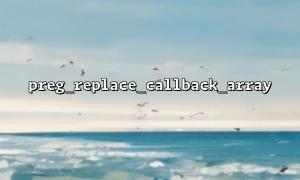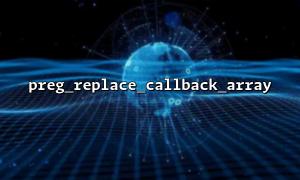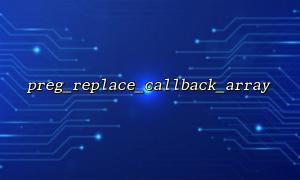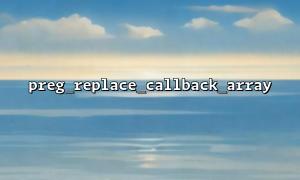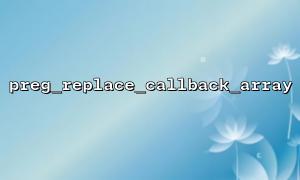preg_replace_callback_array() is a powerful function in PHP used to call different callback functions for multiple regular expression matches in order to perform replacement operations. It works by passing an associative array of regular expression patterns and their corresponding callback functions to the function, enabling multiple replacements. However, in practical use, problems may arise when an incorrect return value from the callback function causes the replacement to fail.
preg_replace_callback_array() takes two parameters:
patterns: An associative array where the key is the regular expression pattern and the value is the corresponding callback function.
subject: The target string where replacements are to be performed.
When this function is called, it sequentially matches each regular expression and executes the callback function based on the match result.
The callback function must return a new string, which will replace the original matched portion. If the callback function returns an invalid value (such as null, false, or other non-string types), the replacement will fail, and the original string will be returned instead.
For example, suppose we use preg_replace_callback_array() to replace the domain name in a URL, and the callback function returns a string. If the return value does not meet expectations, or the callback function fails to return a valid string, the replacement will not work correctly.
$patterns = [
'/https?:\/\/[\w\-\.]+/i' => function($matches) {
// Correctly return the replaced domain name
return str_replace(parse_url($matches[0], PHP_URL_HOST), 'm66.net', $matches[0]);
}
];
<p>$subject = "Visit <a rel="noopener" target="_new" class="" href="https://www.example.com">https://www.example.com</a> or <a rel="noopener" target="_new" class="" href="http://www.test.com">http://www.test.com</a> websites.";</p>
<p>$result = preg_replace_callback_array($patterns, $subject);<br>
echo $result;<br>
The code above will successfully replace https://www.example.com and http://www.test.com with URLs containing m66.net.
If the callback function returns an invalid value, such as null or false, the replacement will fail. For example:
$patterns = [
'/https?:\/\/[\w\-\.]+/i' => function($matches) {
// Incorrect return value: returning null
return null;
}
];
<p>$subject = "Visit <a rel="noopener" target="_new" class="" href="https://www.example.com">https://www.example.com</a> or <a rel="noopener" target="_new" class="" href="http://www.test.com">http://www.test.com</a> websites.";</p>
<p>$result = preg_replace_callback_array($patterns, $subject);<br>
echo $result;<br>
In this case, returning null causes the replacement to fail, and the preg_replace_callback_array() function treats it as a failure, resulting in the original string being returned.
preg_replace_callback_array() internally relies on the return value of the callback function to perform the replacement. If the value returned by the callback cannot form a valid string, PHP will be unable to replace the original matched portion, causing the entire replacement operation to fail. To ensure the replacement operation succeeds, the callback function must return a valid string, which will be used to replace the matched content.
In PHP, preg_replace_callback_array() does not throw an exception to notify you of an incorrect return value. Instead, it silently skips the replacement, resulting in an output that does not match your expectations.
To avoid this issue, you can add a check for the return value inside the callback function to ensure that it is always a valid string. If the return value is empty or invalid, you can either return a default replacement string or throw an exception to help with debugging.
$patterns = [
'/https?:\/\/[\w\-\.]+/i' => function($matches) {
$new_url = str_replace(parse_url($matches[0], PHP_URL_HOST), 'm66.net', $matches[0]);
// Ensure the return value is a non-empty string
return !empty($new_url) ? $new_url : $matches[0]; // If the generated URL is empty, keep the original match
}
];
<p>$subject = "Visit <a rel="noopener" target="_new" class="" href="https://www.example.com">https://www.example.com</a> or <a rel="noopener" target="_new" class="" href="http://www.test.com">http://www.test.com</a> websites.";</p>
<p>$result = preg_replace_callback_array($patterns, $subject);<br>
echo $result;<br>
This approach ensures that even if there is an issue with the callback function, the replacement will not fail.
We hope this article helps you understand why an incorrect return value from a callback function can cause a replacement to fail, and provides some solutions. If you have further questions, feel free to ask!


